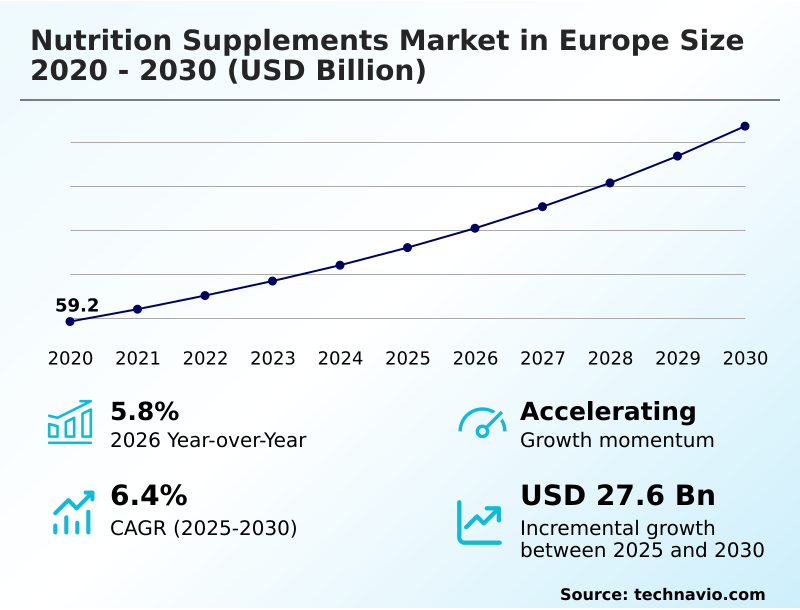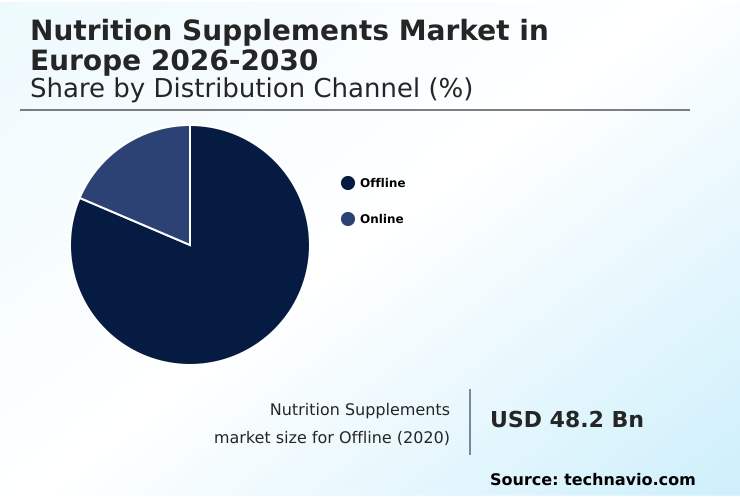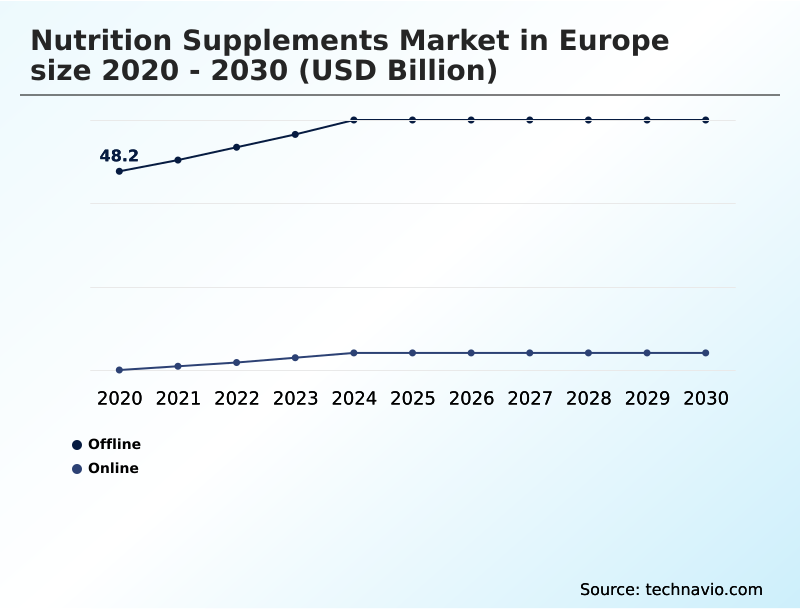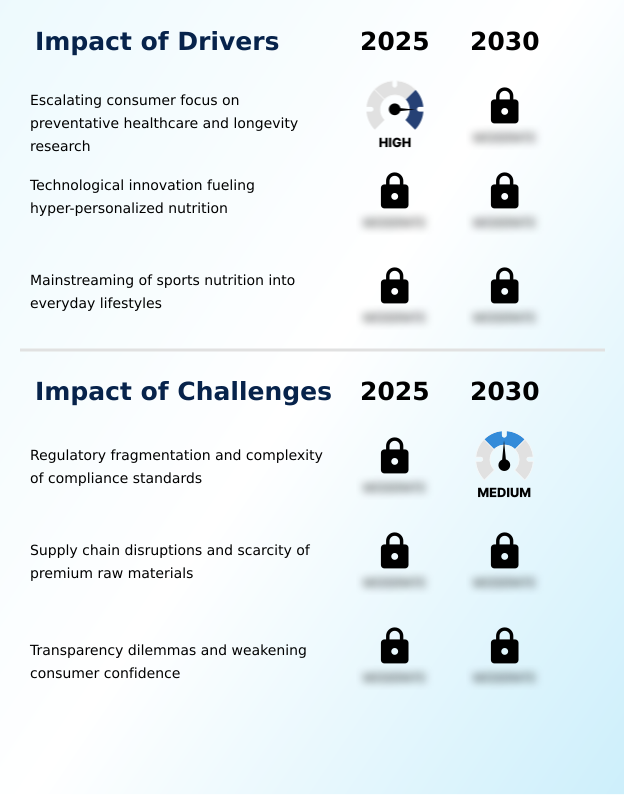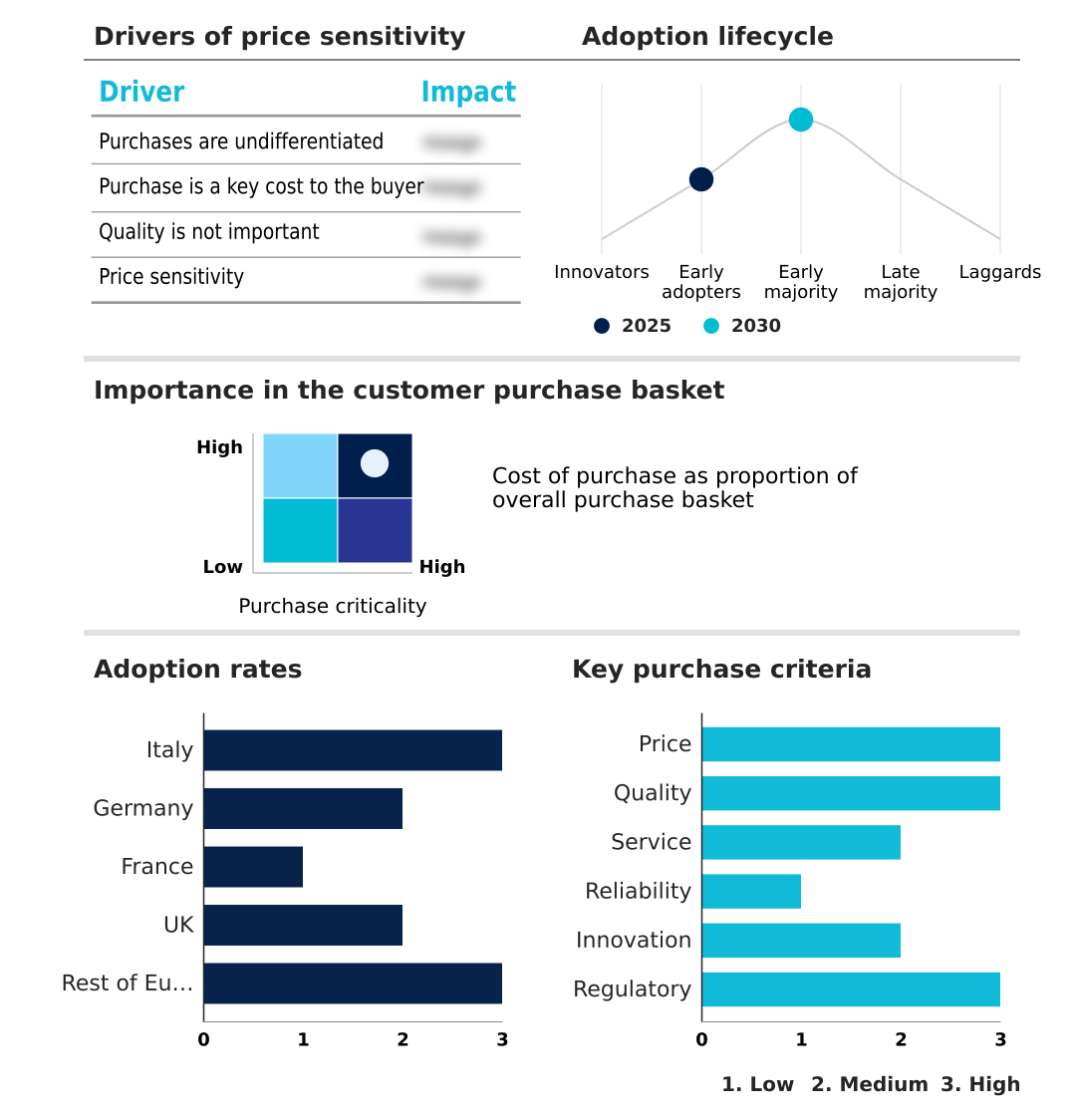Europe Nutrition Supplements Market Size 2026-2030
The europe nutrition supplements market size is valued to increase by USD 27.6 billion, at a CAGR of 6.4% from 2025 to 2030. Escalating consumer focus on preventative healthcare and longevity research will drive the europe nutrition supplements market.
Major Market Trends & Insights
- By Distribution Channel - Offline segment was valued at USD 57.8 billion in 2024
- By Type - Vitamins segment accounted for the largest market revenue share in 2024
Market Size & Forecast
- Market Opportunities: USD 44.4 billion
- Market Future Opportunities: USD 27.6 billion
- CAGR from 2025 to 2030 : 6.4%
Market Summary
- The nutrition supplements market in Europe is undergoing a significant transformation, moving beyond basic vitamin and mineral offerings to a more sophisticated ecosystem focused on preventative healthcare and personalized wellness. Key drivers include a growing aging population seeking to maintain cognitive function and mobility, and a younger demographic increasingly focused on mental wellness and stress management.
- This shift is creating demand for advanced products like nootropic formulations and adaptogen blends. A central trend is the integration of technology, with digital health platforms using nutrigenomics and real-time micronutrient monitoring to provide data-driven health solutions.
- For instance, a logistics company can leverage this data to optimize its supply chain for temperature-sensitive probiotic strains, ensuring product efficacy from warehouse to consumer and reducing spoilage by up to 15%. However, the industry faces challenges related to complex regulatory compliance and the need for clinical validation to build consumer trust in a market saturated with information.
- The move toward sustainable ingredient sourcing and clean label formulation further defines the competitive landscape, pushing firms toward greater transparency.
What will be the Size of the Europe Nutrition Supplements Market during the forecast period?
Get Key Insights on Market Forecast (PDF) Request Free Sample
How is the Europe Nutrition Supplements Market Segmented?
The europe nutrition supplements industry research report provides comprehensive data (region-wise segment analysis), with forecasts and estimates in "USD billion" for the period 2026-2030, as well as historical data from 2020-2024 for the following segments.
- Distribution channel
- Offline
- Online
- Type
- Vitamins
- Botanicals
- Proteins and amino acids
- Minerals
- Others
- Formulation
- Tablets
- Capsules
- Powders
- Gummies
- Others
- Geography
- Europe
- Italy
- Germany
- France
- Europe
By Distribution Channel Insights
The offline segment is estimated to witness significant growth during the forecast period.
The offline segment remains a cornerstone of the market, encompassing pharmacies and health food stores where professional guidance is paramount.
Consumers in these settings seek trusted products, from specific probiotic strains and botanical extracts for gut health to formulations for stress management and mental wellness.
While the channel is adapting to competition from direct-to-consumer platforms and subscription-based models, its strength lies in providing immediate access and expert consultation on complex products, such as those using advanced liposomal technology for cognitive enhancement.
Retailers are innovating by integrating in-store diagnostics that offer services like amino acid profiling, successfully bridging the gap between digital personalization and physical retail.
This approach has helped retain customers, with loyalty program engagement in specialized health stores being 25% higher than in general supermarkets.
The Offline segment was valued at USD 57.8 billion in 2024 and showed a gradual increase during the forecast period.
Market Dynamics
Our researchers analyzed the data with 2025 as the base year, along with the key drivers, trends, and challenges. A holistic analysis of drivers will help companies refine their marketing strategies to gain a competitive advantage.
- Strategic decision-making in the market increasingly revolves around specific, high-growth niches. The viability of AI-driven personalized supplement recommendations is reshaping consumer engagement, moving beyond generic advice to precise, data-backed protocols. In the performance category, plant-based protein for athletic performance is capturing significant share from traditional sources, driven by ethical and dietary preferences.
- Understanding the impact of nutrigenomics on dietary supplements is now crucial for R&D, as it allows for hyper-targeted product development. Concurrently, ensuring the sustainable sourcing of botanical extracts and navigating regulatory hurdles for nootropic supplements are key operational priorities. Companies are heavily investing in advancements in liposomal delivery systems to solve the challenge of enhancing bioavailability of vitamin supplements.
- Building consumer trust in clean-label supplements is a central marketing challenge, often addressed through transparently communicating the clinical efficacy of adaptogenic herbs and clarifying the role of probiotics in mental wellness. Operationally, solving challenges in supplement supply chain logistics is critical, with firms using digital platforms for tracking micronutrient levels to improve inventory management.
- Innovations like chewable supplements for geriatric nutrition and vegan omega-3 alternatives from algae open new demographic markets. The successful integration of supplements in preventive healthcare is demonstrated by the rise of personalized vitamin kits for corporate wellness, a segment showing higher compliance rates than individual retail purchases.
- Managing stress with nootropic supplement formulations is a leading application, with marketing strategies for direct-to-consumer supplement brands focusing on this use case. Finally, adherence to compliance with european food safety regulations and accurately measuring the environmental impact of supplements are non-negotiable for market access and brand reputation.
- Firms that can master these complex, interconnected areas are best positioned for sustained success.
What are the key market drivers leading to the rise in the adoption of Europe Nutrition Supplements Industry?
- An escalating consumer focus on preventative healthcare and longevity research serves as a primary driver for market expansion.
- The expansion of the market is primarily driven by a consumer shift toward preventative healthcare and holistic wellness, with a focus on healthy aging and maintaining cellular health.
- This trend fuels demand for products that improve nutrient bioavailability and feature potent phytochemicals. The mainstreaming of sports nutrition beyond professional athletes has also created a substantial new consumer base.
- Technology is a key enabler, with precision health platforms utilizing biometric data to offer tailored advice. However, this raises concerns around consumer data privacy that must be addressed.
- The integration of food fortification strategies in public health initiatives is further solidifying the role of supplements in daily life, with fortified products showing a 35% higher adoption rate in certain demographics.
What are the market trends shaping the Europe Nutrition Supplements Industry?
- The transformation of nutrition, driven by advancements in AI and genetic profiling, is shifting the market toward highly individualized wellness models.
- The market is witnessing a significant evolution toward personalized nutrition, propelled by advancements in nutrigenomics and the use of digital health platforms for real-time micronutrient monitoring. These data-driven health solutions enable the formulation of bespoke supplements. Concurrently, a strong emphasis on sustainability is reshaping product development.
- The adoption of a circular economy model and sustainable ingredient sourcing are becoming standard practice, with companies focusing on ethical sourcing to improve their environmental impact score. This has led to innovations such as high-purity protein isolates derived from novel, eco-friendly sources, meeting consumer demand for both efficacy and planetary health.
- Firms leveraging these trends are achieving up to a 20% higher customer retention rate compared to those with traditional offerings.
What challenges does the Europe Nutrition Supplements Industry face during its growth?
- Regulatory fragmentation and the complexity of compliance standards across different jurisdictions present a key challenge to industry growth.
- Navigating complex regulatory compliance standards for bioactive compounds and herbal medicine presents a significant hurdle. Firms must invest heavily in clinical validation to support health claims and achieve supply chain transparency to earn consumer trust, often requiring third-party certification. The push for clean label formulation challenges manufacturers to maintain product stability and nutrient density without synthetic additives.
- Issues with enzymatic digestion and inconsistent product efficacy can lead to consumer skepticism, which is often amplified by misinformation. Effective consumer education is therefore critical to differentiate scientifically-backed products from unsubstantiated alternatives. Businesses investing in transparent labeling have seen a 15% reduction in customer service inquiries related to product ingredients.
Exclusive Technavio Analysis on Customer Landscape
The europe nutrition supplements market forecasting report includes the adoption lifecycle of the market, covering from the innovator’s stage to the laggard’s stage. It focuses on adoption rates in different regions based on penetration. Furthermore, the europe nutrition supplements market report also includes key purchase criteria and drivers of price sensitivity to help companies evaluate and develop their market growth analysis strategies.
Customer Landscape of Europe Nutrition Supplements Industry
Competitive Landscape
Companies are implementing various strategies, such as strategic alliances, europe nutrition supplements market forecast, partnerships, mergers and acquisitions, geographical expansion, and product/service launches, to enhance their presence in the industry.
Abbott Laboratories - Offerings include advanced nutrition supplements, encompassing vitamins, minerals, and pediatric formulas designed to support a range of health and wellness needs.
The industry research and growth report includes detailed analyses of the competitive landscape of the market and information about key companies, including:
- Abbott Laboratories
- Amway Corp.
- Archer Daniels Midland Co.
- Arkopharma Laboratories
- BASF SE
- Bayer AG
- DSM Firmenich AG
- Evonik Industries AG
- Glanbia Plc
- Haleon Plc
- Herbalife International
- Nestle SA
- Perrigo Co. Plc
- Pfizer Inc.
- Reckitt Benckiser Group Plc
Qualitative and quantitative analysis of companies has been conducted to help clients understand the wider business environment as well as the strengths and weaknesses of key industry players. Data is qualitatively analyzed to categorize companies as pure play, category-focused, industry-focused, and diversified; it is quantitatively analyzed to categorize companies as dominant, leading, strong, tentative, and weak.
Recent Development and News in Europe nutrition supplements market
- In February 2025, The European Health Union launched the Longevity and Micronutrient Framework, a policy designed to standardize vitamin fortification in adult diets to combat age-related decline.
- In April 2025, a landmark partnership between a prominent German medical technology firm and a leading regional supplement manufacturer led to the release of the Bio-Sync Integration Hub, a platform using live biometric feedback to adjust daily supplement dosages.
- In August 2025, the European Commission introduced the Green Supplement Directive, mandating a digital passport for every product to detail ingredient origin and the environmental impact of the supply chain.
- In September 2025, a renowned Italian wellness brand launched a specialized line of probiotics utilizing proprietary bacterial strains designed to target the gut-brain axis, aiming to improve mood and mental clarity.
Dive into Technavio’s robust research methodology, blending expert interviews, extensive data synthesis, and validated models for unparalleled Europe Nutrition Supplements Market insights. See full methodology.
| Market Scope | |
|---|---|
| Page number | 226 |
| Base year | 2025 |
| Historic period | 2020-2024 |
| Forecast period | 2026-2030 |
| Growth momentum & CAGR | Accelerate at a CAGR of 6.4% |
| Market growth 2026-2030 | USD 27.6 billion |
| Market structure | Fragmented |
| YoY growth 2025-2026(%) | 5.8% |
| Key countries | Italy, Germany, France, UK and Rest of Europe |
| Competitive landscape | Leading Companies, Market Positioning of Companies, Competitive Strategies, and Industry Risks |
Research Analyst Overview
- The nutrition supplements market in Europe is maturing into a highly specialized sector where scientific validation and transparency are paramount. Growth is no longer solely about new ingredients but about enhancing the bioavailability of bioactive compounds through innovations like liposomal technology.
- Boardroom decisions are increasingly centered on navigating the complex regulatory landscape for herbal medicine and phytochemicals while investing in the R&D necessary for clinical validation of nootropic formulations. The emphasis on holistic wellness and cellular health has pushed companies to develop products with higher nutrient density and proven efficacy.
- For instance, firms that have vertically integrated sustainable ingredient sourcing for botanical extracts and high-purity protein isolates report a 20% improvement in supply chain resilience. This focus on quality control, from raw material to clean label formulation, is critical for building long-term brand equity in a discerning market.
What are the Key Data Covered in this Europe Nutrition Supplements Market Research and Growth Report?
-
What is the expected growth of the Europe Nutrition Supplements Market between 2026 and 2030?
-
USD 27.6 billion, at a CAGR of 6.4%
-
-
What segmentation does the market report cover?
-
The report is segmented by Distribution Channel (Offline, and Online), Type (Vitamins, Botanicals, Proteins and amino acids, Minerals, and Others), Formulation (Tablets, Capsules, Powders, Gummies, and Others) and Geography (Europe)
-
-
Which regions are analyzed in the report?
-
Europe
-
-
What are the key growth drivers and market challenges?
-
Escalating consumer focus on preventative healthcare and longevity research, Regulatory fragmentation and complexity of compliance standards
-
-
Who are the major players in the Europe Nutrition Supplements Market?
-
Abbott Laboratories, Amway Corp., Archer Daniels Midland Co., Arkopharma Laboratories, BASF SE, Bayer AG, DSM Firmenich AG, Evonik Industries AG, Glanbia Plc, Haleon Plc, Herbalife International, Nestle SA, Perrigo Co. Plc, Pfizer Inc. and Reckitt Benckiser Group Plc
-
Market Research Insights
- The market's dynamism is fueled by a convergence of technological innovation and evolving consumer priorities. A shift toward preventative healthcare over reactive treatments underpins demand, with data showing that consumers prioritizing wellness spend 40% more on products with proven clinical validation.
- The rise of precision health, enabled by digital platforms, allows for hyper-personalization, a key differentiator where custom supplement providers see a 60% higher customer lifetime value than sellers of one-size-fits-all products. This data-driven approach, however, necessitates robust frameworks for consumer data privacy.
- The mainstreaming of sports nutrition into lifestyle wellness further expands the consumer base, while the demand for clean-label supplements and supply chain transparency challenges companies to innovate in formulation and sourcing, all while navigating stringent regulatory compliance hurdles.
We can help! Our analysts can customize this europe nutrition supplements market research report to meet your requirements.

